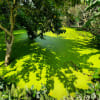Give back the forests, take away this city

The title of this story is from the poem "To Civilization" by Rabindranath Tagore. An excerpt appears below:
Give us back those forests–take away this city,
Take all your iron, your wheels, your stone and timber.
O New Civilization! O cruel, all-devouring force,
Return that sacred grove, that pure and holy shade,
Those days untouched by shame, those evening baths in peace,
Those open pastures, and that tranquil song...
Evening is approaching. Fulbanu stands by the pond in the back of the house with her grandson, waiting for her husband, Syed Ali, to return from the market. The pond is nestled behind the house, where a bamboo grove leans over it. Throughout the day, the bamboo casts shadows on the water, keeping it very cool. This pond wasn't always this big. It used to be more like a small waterhole, although its water was always as clear as a mirror. The farmhand boy of the house would bathe the cattle there. There is a story behind how this waterhole turned into a pond.
Fulbanu's only son, Suruj, got married and occasionally brought his wife home from the city to visit. The city-born bride was accustomed to bathing in supplied water. Fetching water from the communal village tube well for her bath was becoming a hassle. So, a makeshift bathing area was arranged for her behind the house by enclosing a space with jute sticks and laying bricks on the ground. But the bride wasn't satisfied with bathing in such a small amount of water.

Then, Syed Ali, wanting to ensure that his daughter-in-law could bathe comfortably within the house premises, had the pond dug overnight. Suruj's wife knew how to swim, but since growing up in the city, she hadn't had the opportunity to bathe by swimming. She was overjoyed to have a pond of her own. To get a good water supply while digging, they had to go quite deep, which meant removing a lot of soil. This extra soil was piled around the pond, creating high banks. From the top of these banks, one could see far across the fields.
Only the women of the household bathed in this pond. Whenever Suruj's wife came to the house, neighbouring women and young brides were invited to join in groups to bathe there. Whenever Suruj's wife and Fulbanu's grandson stayed at the house, it felt like a festival.
Syed Ali had released fish into the pond. Occasionally, the farmhand would catch fish using a traditional bamboo trap, called a polo. Syed Ali recognised all the fish in the pond. If a large rui or katla fish got caught, he would say, "Leave that one, we'll catch it when Suruj comes home."
Standing by the pond, waiting for her husband, was an old habit of Fulbanu's. Just as people lean forward to look for a train, knowing it will arrive on time, Fulbanu would gaze down the road, waiting.
Syed Ali had married Fulbanu when she was only eight or nine years old, and he was a young man of 21. He first saw little Fulbanu on her way to the maktab (religious school) and was instantly drawn to the sweet little girl. Syed Ali's family were wealthy farmers in the village. His father had divided his property between his two sons while still alive. Fulbanu's family, on the other hand, was not well-off. They were hardly in a position to refuse Syed Ali's marriage proposal. So, the condition was set that, when Fulbanu turned 12, he would bring her to his home.
After her twelfth birthday, Syed Ali went to claim Fulbanu and brought her to his house with great celebration. At first, the young girl was afraid of him and wouldn't go near him. At night, she would curl up in a corner of the bed under a quilt. Syed Ali never forced her to come closer.
It so happened that Fulbanu was terribly afraid of ghosts. Once evening had fallen, she refused to step outside. Syed Ali decided to use this fear to his advantage, and devised a small trick with the help of a friend. One evening, someone outside the house began calling Fulbanu's name in a ghostly voice. Terrified, she buried her face in Syed Ali's chest as he pretended to be asleep. To comfort her, Syed Ali lit a small oil lamp and stepped outside.
"There's no one here. Don't be afraid," he reassured her.
Then he put out the lamp and lay back down. That night, the air was filled with the faint fragrance of jasmine. In that quiet moment, they found themselves drawn to each other. There was no sound except the silent rhythm of their breathing. The outside world seemed to fade away—there were only the two of them. Syed Ali didn't rush. In their shy, hesitant touches, a new love was discovered.
As Fulbanu waited for Syed Ali, she thought about her only son, Suruj. She remembered that Suruj was the first man among five neighbouring villages to acquire his bachelor's degree. This was a great source of pride for her. After completing fourth grade at the village minor school, Suruj, like most other boys, would have likely joined his father in farming. However, in fourth grade, he received a scholarship for free education, and the news was so significant that the headmaster himself came to their house to inform them.
He called Syed Ali and said, "Your son is a gem; his studies must not stop. I will take him to study at Kishoreganj High School. I will arrange lodging for him in the city at the house of someone I know—a well-off family. He won't have any problems. In exchange for tutoring their two little children, he will get free room and board."
Fulbanu, despite her tears, entrusted her only son, the dearest part of her heart, to Allah and sent him off to study. Suruj later passed his matriculation, then completed his intermediate and bachelor's degrees from Gurudayal College in Kishoreganj. Now, he is a teacher at a school in the city, married and has a son of his own. Suruj's son, Sajal, visits his grandparent's village whenever school is on break. He roams all over the village and everybody in the village loves him
As Fulbanu stands by the pond, she can see rows of electric lights glowing around the Kaliachapra Sugar Mill in the distance. A few years ago, this sugar mill was established about two miles from their village.
She thinks to herself, "I wonder how wealthy that 'Paidisi man' (Actually it was EPIDC, or East Pakistan Industrial Development Corporation) must be? How much money he must have, otherwise how could he have built such a big mill?"
Ever since the mill was established, the socio-economic landscape of the area had changed drastically. Huge buildings were constructed near the mill. Thousands of people worked there. Countless lights shone, twinkling like stars. The images of these lights were mirrored in the pond's water. A massive chimney released smoke into the blue sky, and sometimes, the smoke gathered and floated around like dark clouds.
Day and night, sirens blared, signaling the end of one shift and the beginning of the next. Trucks roared down the road, kicking up dust. One after another, trailers loaded with sugarcane were hauled back and forth.
Fulbanu turns to her grandson, who is on a visit from the city.
She asks, "Can you tell me how much money you think that 'Paidisi man' has?"
Sajal replies, "Grandma, it's not a person. It's an office of the Pakistani government that gave the mill to the village."
Fulbanu doesn't quite understand, but she knows the name of the President of Pakistan, Ayub Khan. She doesn't know much else about the government.
In the evening light, from the high bank of the pond, Fulbanu can see, as usual, some people walking home with flashlights in hand. The District Board Road curves away from the pond and heads towards another village. Those who live in the village to the west walk down a side path from the road and cut through the fields.
This is the first part of a two-part story.
Abdullah Zahid is a Bangladeshi-American writer, librarian, and cultural commentator based in New York. He began his literary journey as a columnist for Jaijaidin, where his widely-read column "Manhattan Diary" was later published as a book of the same name. The second edition of the book was released in 2024.

 For all latest news, follow The Daily Star's Google News channel.
For all latest news, follow The Daily Star's Google News channel. 








Comments